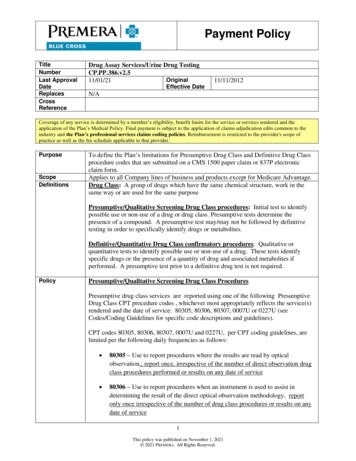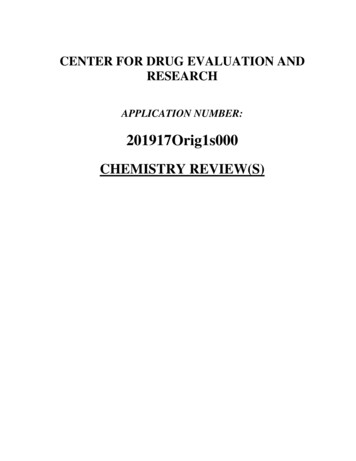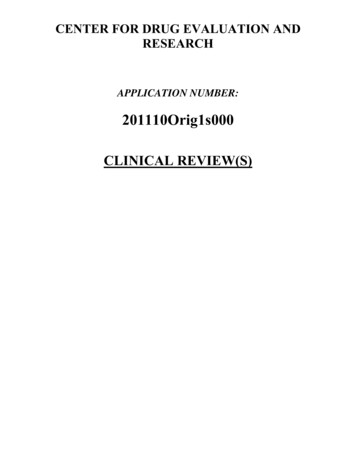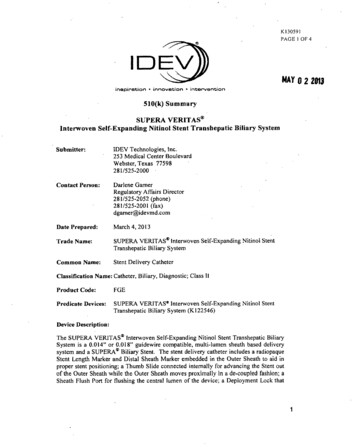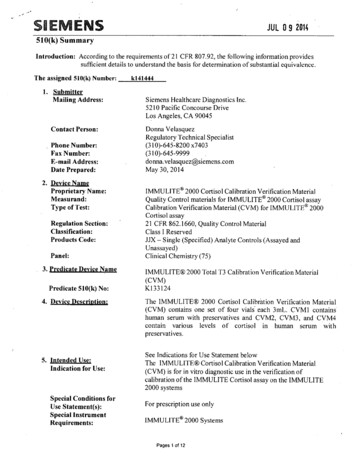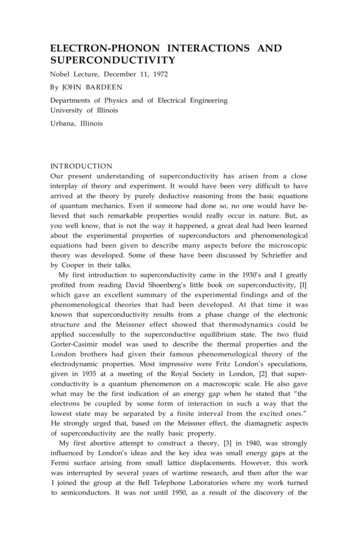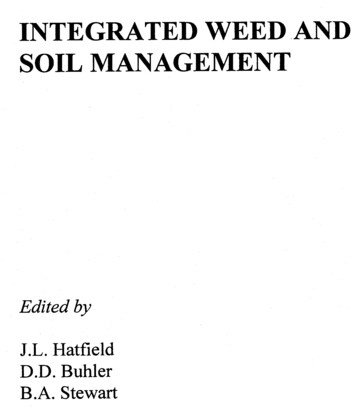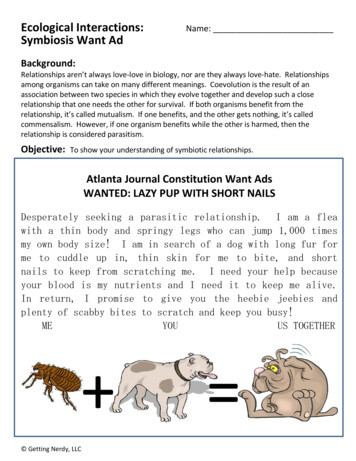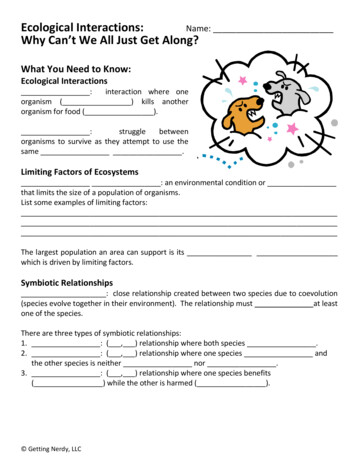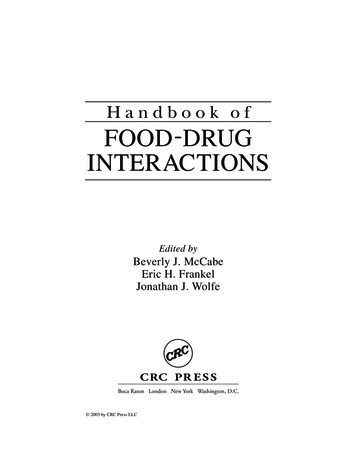
Transcription
Handbook ofFOOD -DRUGINTERACTIONSEdited byBeverly J. McCabeEric H. FrankelJonathan J. WolfeCRC PR E S SBoca Raton London New York Washington, D.C. 2003 by CRC Press LLC
Library of Congress Cataloging-in-Publication DataHandbook of food-drug interactions / edited by Beverly J. McCabe, Jonathan J. Wolfe,Eric H. Frankel.p. cm.Includes bibliographical references and index.ISBN 0-8493-1531-X1. Drug-nutrient interactions—Handbooks, manuals, etc. I. McCabe, Beverly J. II.Wolfe, Jonathan James, 1944- III. Frankel, Eric H.RM302.4.H36 2003615′.7045—dc212002041312This book contains information obtained from authentic and highly regarded sources. Reprinted materialis quoted with permission, and sources are indicated. A wide variety of references are listed. Reasonableefforts have been made to publish reliable data and information, but the author and the publisher cannotassume responsibility for the validity of all materials or for the consequences of their use.Neither this book nor any part may be reproduced or transmitted in any form or by any means, electronicor mechanical, including photocopying, microfilming, and recording, or by any information storage orretrieval system, without prior permission in writing from the publisher.All rights reserved. Authorization to photocopy items for internal or personal use, or the personal or internaluse of specific clients, may be granted by CRC Press LLC, provided that 1.50 per page photocopied ispaid directly to Copyright Clearance Center, 222 Rosewood Drive, Danvers, MA 01923 USA. The feecode for users of the Transactional Reporting Service is ISBN 0-8493-1531-X/03/ 0.00 1.50. The feeis subject to change without notice. For organizations that have been granted a photocopy license by theCCC, a separate system of payment has been arranged.The consent of CRC Press LLC does not extend to copying for general distribution, for promotion, forcreating new works, or for resale. Specific permission must be obtained in writing from CRC Press LLCfor such copying.Direct all inquiries to CRC Press LLC, 2000 N.W. Corporate Blvd., Boca Raton, Florida 33431.Trademark Notice: Product or corporate names may be trademarks or registered trademarks, and areused only for identification and explanation, without intent to infringe.Visit the CRC Press Web site at www.crcpress.com 2003 by CRC Press LLCNo claim to original U.S. Government worksInternational Standard Book Number 0-8493-1531-XLibrary of Congress Card Number 2002041312Printed in the United States of America 1 2 3 4 5 6 7 8 9 0Printed on acid-free paper
PrefaceAs health professionals from different disciplines, we learn the basic concepts,terminology, and procedures that are central to our areas of expertise. In doing so,we become acculturated to thinking, interacting, networking, and learning with peersfrom the same discipline. When we begin to interact as members of healthcareteams, we bring our own jargon and mores. Often we assume that others mayunderstand us as fully and completely as our professional peers, but we fail to graspdifferent meanings or focus that others may have on a given subject, case, or problem.The term multidisciplinary is used to define teams in which different disciplines arerepresented but tend to function in isolation of each other. Interdisciplinary meansthat teams combine their unique talents and knowledge to create a working unit.This book is written by an interdisciplinary team of authors and contributorsrepresenting the fields of nutrition, pharmacy, dietetics, medicine, and technology.Each chapter and appendix was viewed from the aspect of different disciplines: “Isthis something everyone knows, or is this something that one discipline is unlikelyto know or is likely to view differently?” “What type of information would behelpful for all disciplines to have readily available?” The book attempts to bringthe detailed and discipline-specific knowledge to other disciplines. In providingcommon concepts, communications among different disciplines can be improvedand, in turn, improve healthcare. The authors of each chapter have worked from aperspective of generic drug names in every case. Example trade names have beenprovided solely for the convenience of readers. In no case do the authors or theeditors intend any endorsement, or imply that the example trademark names possessany advantage over equivalent generic products.The first six chapters introduce basic concepts from pharmacy and from nutritionfor all disciplines. In jointly authored chapters involving more than one discipline,comparisons are sometimes made between the thinking and focus of one disciplinewith the other. For example, Chapter 6 is written by two pharmacists and a dietitianand reflects both similarities and differences in approaches.Chapters 7 through 13 present specific detailed topics of diseases, disorders, andlifestyle choices. Chapters 14 through 17 represent guidance in planning andimplementing counseling programs, meeting accreditation requirements, and application of technology. The appendices provide valuable reference materials, comprehensive summaries of drug and dietary details, and suggested tools that may aidthe practitioner regardless of the discipline. 2003 by CRC Press LLC
The EditorsBeverly J. McCabe, Ph.D., R.D., L.D., as a young psychiatric dietitian, beganthe study of food and drug interactions involving monoamine oxidase inhibitor(MAOI) drugs and pressor amines. In the following years, she found that manyfacilities and review articles recommend unnecessary restrictions based on ill-conceived extrapolation from one food to others. Today, with a compilation of tyremineand other pressor amine values in foods drawn from a comprehensive review of theworld literature, she works closely with physicians and pharmacists to reduce therisks of adverse food and drug interactions. She has published more than 20 articles,monographs, and book chapters, and her students’ abstracts now number over 50from national and international meeting presentations in the last 18 years.Currently, Dr. McCabe serves on the board of editors of the Journal of theAmerican Dietetic Association. She has served as a reviewer for the Journal ofClinical Psychiatry for nutrition articles and as a national officer and on the boardof directors of the American Dietetic Association. She established the list serve forthe Dietetic Educators of Practitioners Dietetic Practice Group and received the firstoutstanding service award from this group in recognition of her contribution. Morerecently, she was named outstanding dietitian in Arkansas for 2002. She has alsobeen honored by the Arkansas affiliate of the American Heart Association forstatewide workshops and presentations on nutrition in heart disease and for development of educational materials.Dr. McCabe has been an innovator in the application of technology to the practiceof nutrition counseling and dietetic education. With a federal grant, she developedan interactive compressed video program to teach healthier cooking techniques torural food service personnel in the Arkansas delta counties. Through a grant of theArkansas Rural Hospital Program, she also pioneered individual and group nutritioncounseling of rural patients on diets for weight control, diabetes, hypertension, andother conditions using the interactive compressed video network that reaches some50 rural hospitals and clinics. Additionally, Dr. McCabe has team counseled withpharmacy faculty using a long-distance counseling technique known as Telehealthand Telenutrition.A dedicated educator, Dr. McCabe has made numerous presentations to layaudiences including television and radio interviews. She has been active in theNational Nutrient Databank Conferences and has a strong interest in food composition and analysis. Her most recent research grant is for the study of the stability ofbiotin in frozen foods.Dr. McCabe received her bachelor of science degree from the University ofArkansas at Fayetteville, her dietetic internship at the University of Kansas MedicalCenter, her master of science from the University of Kansas, and her Ph.D. fromthe University of Iowa.Eric H. Frankel, M.S.E., Pharm.D., B.C.N.S.P., is the nutritional support servicecoordinator for Covenant Health System (formerly Methodist Hospital and St. Maryof the Plains Hospital and Rehabilitation Center) in Lubbock, Texas. He has practiced 2003 by CRC Press LLC
in nutritional support for 22 years. Prior to his pharmacy career, Dr. Frankel earneda bachelor of science in psychology and a master of science in education from theCity College of New York, after which he taught at the secondary level for severalyears. Dr. Frankel received his bachelor of pharmacy degree from Arnold and MarieSchwartz College of Pharmacy in New York City and went on to earn a doctor ofpharmacy degree in 1979 from Mercer University.Still an educator, Dr. Frankel has taught in pharmacy school and served as apreceptor for doctor of pharmacy candidates and for dietetic interns. He is currentlythe director of a residency program for pharmacy practice specializing in nutritionalsupport and is a clinical assistant professor for Texas Tech University Health SciencesCenter School of Pharmacy, as well as an adjunct professor for the School of HumanSciences, Division of Nutrition, in Lubbock. In addition, Dr. Frankel has taughtclasses for physical therapists, dietitians, and respiratory therapists at Texas Tech aswell as Emory University, Georgia State University, and Georgia Tech, all in Atlanta.Besides teaching, he serves as a consultant for home care patients receiving nonvolitional nutrition outside the hospital and has been appointed to represent the TexasPharmacy Association to the U.S. Pharmacopeial Convention. He has been an authorof several articles in the nutritional support and pharmacy literature, and has spokenat numerous local, state, and national meetings.Jonathan J. Wolfe, Ph.D., R.Ph., is currently associate dean of the College ofPharmacy at the University of Arkansas for Medical Sciences in Little Rock. Histeaching responsibilities within the college include professional ethics, history ofpharmacy, and intravenous therapy. He also works with an interdisciplinary facultyto offer a course in death and dying. His current research interests are medicationerror reduction and history. He recently served as guest curator for an exhibit at theOld State House Museum in Little Rock: Medical Education at the Old State House:From Flexner to New Deal.Dr. Wolfe was educated first as an historian, completing his doctorate at theUniversity of Virginia in Charlottesville. After 3 years of teaching college courses,he returned to school and earned his degree in pharmacy. His practice experiencesinclude hospital pharmacy and home infusion pharmacy. He joined the faculty atthe pharmacy college full time in 1991.His other service reflects his interest in pain treatment and end-of-life care. Hewas a cofounder of the Arkansas Cancer Pain Initiative and has served on the boardof the American Association of State Cancer Pain Initiatives. In addition, he wasappointed a delegate to the U.S. Pharmacopeia in 1995, continuing to serve in thatcapacity through February 2003. 2003 by CRC Press LLC
ContributorsAlbert Barrocas, M.D., F.A.C.S., F.A.C.N.Pendleton Memorial Methodist HospitalTulane UniversityNew Orleans, LouisianaTiffany R. Bolton, Pharm.D.DCH Regional Medical CenterTuscaloosa, AlabamaNancy Carthan, Pharm.D., C.D.E.Southeast Dallas Health CenterDallas, TexasRonni Chernoff, Ph.D., R.D., F.A.D.A.Arkansas Center on AgingGeriatrics Research, Education and Clinical Center, Central Arkansas VeteransHealthcare SystemCollege of Public HealthUniversity of Arkansas for Medical SciencesLittle Rock, ArkansasHowell Foster, Pharm.D.Arkansas Poison Control CenterCollege of PharmacyUniversity of Arkansas for Medical SciencesLittle Rock, ArkansasEric H. Frankel, M.S.E., Pharm.D., B.C.N.S.P.Covenant Health SystemTexas Tech University Health Sciences CenterDepartment of Food and Nutrition, College of Human SciencesTexas Tech UniversityLubbock, TexasPaul O. Gubbins, Pharm.D.Department of Pharmacy Practice, College of PharmacyUniversity of Arkansas for Medical SciencesLittle Rock, Arkansas 2003 by CRC Press LLC
Bill J. Gurley, Ph.D.Department of Pharmaceutical Sciences, College of PharmacyUniversity of Arkansas for Medical SciencesLittle Rock, ArkansasDorothy W. Hagan, Ph.D., R.D., L.D., F.A.D.A.Oregon Health Sciences UniversityPortland, OregonReza Hakkak, Ph.D.Department of Dietetics and Nutrition, College of Health Related ProfessionsUniversity of Arkansas for Medical SciencesLittle Rock, ArkansasJan K. Hastings, Ph.D.Department of Pharmacy Practice, College of PharmacyUniversity of Arkansas for Medical SciencesLittle Rock, ArkansasJohn W. Holladay, Ph.D.Prescription Compounding of SumterSumter, South CarolinaCharles W. Jastram, Jr., Pharm.D., B.C.N.S.P.University of Louisiana at MonroeMedical Center of Louisiana—Charity CampusNew Orleans, LouisianaKim E. Light, Ph.D.Department of Pharmaceutical Sciences and Department of InterdisciplinaryToxicology and PharmacologyUniversity of Arkansas for Medical SciencesLittle Rock, ArkansasRazia Malik, Pharm.D.Niles, MichiganBeverly J. McCabe, Ph.D., R.D., L.D.Department of Dietetics and NutritionCollege of Health Related Professions and College of Public HealthUniversity of Arkansas for Medical SciencesLittle Rock, Arkansas 2003 by CRC Press LLC
Beth Miller, Pharm.D.Methodist University Pain InstituteMemphis, TennesseeKathleen M. Strausburg, M.S, R.Ph., B.C.N.S.P.Lakewood, ColoradoPete TanguayRock-Pond Solutions, Inc.Conway, ArkansasJonathan J. Wolfe, Ph.D., R.Ph.Associate Dean, College of PharmacyUniversity of Arkansas for Medical SciencesLittle Rock, ArkansasFantahun Yimam, Pharm.D., B.C.N.S.P.Covenant Health SystemLubbock, Texas 2003 by CRC Press LLC
ContentsChapter 1Pharmacy: Basic Conc
Handbook of food-drug interactions / edited by Beverly J. McCabe, Jonathan J. Wolfe, Eric H. Frankel. p. cm. Includes bibliographical references and index. ISBN 0-8493-1531-X 1. Drug-nutrient interactions—Handbooks, manuals, etc. I. McCabe, Beverly J. II. Wolfe, Jonathan James, 1944- III. Frankel, Eric H. RM302.4.H36 2003 615′.7045—dc21 2002041312. Preface As health professionals
